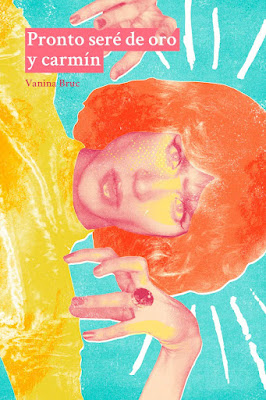In Pronto seré de oro y carmín (Soon I Will Be Gold and Carmine), Vanina Bruc has crafted a radiant literary mosaic of queer, trans, drag, and otherwise dissident lives, characters whose very existence resists normalization. With tender prose and hallucinatory precision, Bruc immerses readers in an expansive and unruly cosmos populated by the alienated and the extraordinary: housewives disenchanted with domesticity, theatre lovers in provincial towns, cosmic pharaohs, spectral drag queens, and witches rising into their own power.
This is a book that doesn’t whisper its resistance, it sings it in gold and carmine, with a voice as brave as it is lyrical.
Published by the audacious Spanish publisher Dos Bigotes, Pronto seré de oro y carmín defies easy categorization. It reads like a collection of short stories, but the pieces are stitched together by a shared spirit of defiance and illumination. Each narrative is a portal into an interior world colored by fear, desire, confusion, and yearning. This is not simply a book about gender or sexuality, it is a book about refusal, about disobedience, and about the beauty that grows in the cracks of conformity.
The magic of Pronto seré de oro y carmín lies in its unapologetic embrace of fluidity, of identity, of genre, of narrative logic.
From the moment we meet Lindo, lying beneath the angels painted on the ceiling of a Roman hotel, fantasizing about escape, we know we are in a liminal space. These stories do not concern themselves with tidy arcs or moral conclusions. Instead, they offer glimpses into moments of fracture and becoming.
Keiko, who wakes up soaked in cat urine, prepares for a performance that blends memory, nationality, and art. Her Japan is both real and imagined, a birthplace, a trauma, and a creative impulse. Florence, more grounded but no less provocative, kills a bird in her garden on Christmas Day and serves it to her family, upending domestic tradition with quiet fury. In another story, a character named Nefar is reborn from a mythic, pharaonic Egypt into a celestial being, a cosmic reconfiguration of historical identity.
And then there is Bandita, who steals the show with her longing and glitter. She rides in a convertible, adorned in drag, chasing love like a whisper on the wind. Her plea, “Love me, however you can”, is both a prayer and a command.
Through Bandita, Bruc explores the line between performance and selfhood, between illusion and authenticity, and reminds us that transformation is not a costume, it is a ritual.
One of the most striking pieces in the book centers on Edmundo and Carmela, locked in a trial for witchcraft. Told from dual perspectives, the inquisitor and the accused, the story is a masterclass in empathy and inversion. Carmela, at the brink of execution, is not broken. She is terrified, yes, but also proud, regal, divine. She raises her fist and screams to herself, “Pronto seré de oro y carmín”, a declaration of future radiance, of unshakable inner truth.
This moment encapsulates the ethos of Bruc’s work: a belief in transformation not as escape but as emergence. Even at the edge of annihilation, her characters find beauty. Even in their fear, they find light. Carmela does not plead for innocence, she reclaims her power. She becomes myth. And through her, so do we.
Though many of Bruc’s characters fall into familiar categories of LGBTQ+ experience, trans, drag, lesbian, queer, the book also pays homage to less visible forms of rebellion. One character reads theatre in a sleepy village, an act of quiet defiance in a world that demands silence. Another is simply a housewife who detests her life. Another might be an alien. These aren’t tokens or metaphors, they are fully realized beings, painted with vivid strokes of surrealism, longing, and humor.
Bruc’s language oscillates between poetic abstraction and intimate detail, creating a reading experience that feels like a lucid dream. The colors of her stories, gold, carmine, opal, smoke, are not just descriptive, but thematic. Each character burns with a unique hue, reminding us that identity is not binary, but prismatic.
Vanina Bruc herself is no stranger to artistic metamorphosis. She is a writer, illustrator, model, and performance artist, a multidisciplinary creator whose work destabilizes conventional aesthetics and norms. Her previous novel Vera introduced readers to her singular voice, but Pronto seré de oro y carmín is something more, a symphony of strangeness, a cathedral of queer magic, a hymn to all those told they are “too much.”
Bruc has written for publications like Vein and Harper’s Bazaar, where her essays continue the work her fiction begins: a passionate defense of difference, a celebration of disobedience, and a refusal to tone herself down. In a literary landscape that often demands neatness and marketability, Bruc offers excess, emotion, and exaltation. She is one of the most vital new voices in Spanish literature, a writer not of the margins, but of the future.
Pronto seré de oro y carmín is not always an easy read, but it is always a necessary one. It acknowledges fear, pain, and confusion without flinching, and then shows us the colors that emerge on the other side.
In Bruc’s universe, identity is a spell, disobedience is sacred, and self-love is nothing short of divine.
This book is for anyone who has ever felt strange. For anyone who has stared into the mirror and wondered. For anyone who has ever dared to want more, more life, more color, more magic. It’s for the Carmelas, the Banditas, the Lindo and Keikos in all of us.
And when the world tries to burn us at the stake, we’ll raise our fists, too, and whisper back:
“Soon I will be gold and carmine.”
Available via Amazon


















Post a Comment